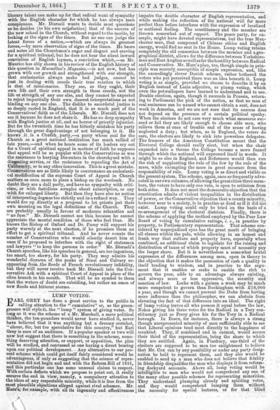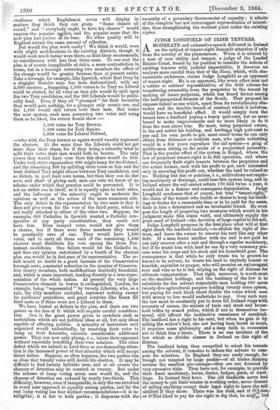LUMP VOTING. E ARL GREY has done a great service to
the public in calling attention to the "cumulative" or, as the green- grocers will style it, the " lump " system of giving votes. So long as it was the scheme of a Mr. Marshall, a mere political thinker, the ten-pounders would never have studied it, never have believed that it was anything but a dreamy crotchet, "clever, Sir, but too speculative for this country," but Earl Grey is sure of an audience. If a popular speaker or two will now but suggest that there is something in the scheme, some- thing deserving attention, or support, or opposition, the plan will be studied, and canvassed as one having a direct bearing upon our political development. Any alternative to our pre- sent scheme which could get itself fairly considered would be advantageous, if only as suggesting that the science of repre- sentation did not begin and end with the Reform Bill of 1831, and this particular one has some unusual claims to respect. With certain defects which we propose to point out, it really secures the end in view, namely, a compulsory attention to the ideas of any respectable minority, while it is free from the most plausible objections alleged against rival schemes. Mr. Hare% for example, with all its ingenuity and effectiveness impairs the double character of English representation, and while making the reflection of the national will far more perfect than before interferes with the expression of localized or sectional feeling. The constituency and the member are thrown somewhat out of rapport. The peace party, for ex- ample, might have devoted representatives, but the true Man- chester man, that compound of Chinese ethics and English energy, would find no seat in the House. Lump voting retains completely the old connection between the member and a geo- graphical district, allows for the difference between Yorkshire- man and East .A.n glian as well as for the hostility between Radical and Conservative. Mr. Hare's plan, too, though simple in prin- ciple was scarcely. susceptible of simple expression, and, like the exceedingly clever Danish scheme, rather bothered the voters who yet perceived there was an idea beneath it. Lump voting is as simple, provided we choose to describe it by an English instead of Latin adjective, as plump voting, which even the potwallopers have learned to understand and to use. Double election, again, though it succeeds in Prussia, return- ing to Parliament the pick of the nation, so that no man of real eminence can be named who cannot obtain a seat, does not work in America, and we are not sure that its success does not depend on the presence of a certain political apathy. When the electors do not care very much what measures suc- ceed or fail they are likely enough to choose able men, who relieve them at once of trouble and of the sense of having neglected a duty ; but when, as in England, the voters do care, the electors are likely to sink into powerless delegates. The framers of the American Constitution meant that the Electoral College should really elect, but when the chair expanded into a throne the College became a mere funnel through which the national will expressed itself in words. It might be so also in England, and Reformers would then run the risk of supplanting the rule of the few by the rule of the mass, while exempting the mass in great measure from the responsibility of rule. Lump voting is as direct and visible as the present system. The scheme, again, once so frequently advo- cated in our own columns, of allo wing the great cities three mem- bers, the voters to have only one vote, is open to criticism from both sides. It does not meet the democratic objection that the constitution admits of violent inequalities in the distribution of power, or the Conservative objection that a county minority, however near to a moiety, is in practice as dead as if it did not exist. Lump voting could only be tried on the basis of a re-arrangement of the electoral districts. Finally, there is the scheme of applying the method employed by the Poor Law Board of voting by cumulative ratings, i. e., in practice by property, to Parliamentary representation. That scheme con- sidered by unprejudiced eyes has the great merit of bringing all classes within the pale, while allowing in an honest and frank way that culture and property have, especially when combined, an additional claim to legislate for the raising and distribution of taxes of which property must of necessity pay the larger share. But it is nevertheless a somewhat brutal expression of the differences among men, open in theory to the objection that it makes the possession of cash a quality in itself tending to wisdom, and in practice to the argu- ment that it enables or seeks to enable the rich to govern the poor, adds to an advantage always existing, and always more or less oppressive, the security and sanction of law. Locke with a guinea a week may be much more competent to govern than Buckingham with £18,000 a year, and though we cannot prevent the Duke from having more influence than the philosopher, we can abstain from elevating the fact of that difference into an ideal. The right of lump voting leaves all who possess it equal before the law, Nokes giving his three votes for the Radical in a Tory con- stituency just as Percy gives his for the Tory in a Radical borough. In Essex, for instance, there is always a strong though unrepresented minority of men sufficiently able to see that Liberal opinions tend most directly to the happiness of mankind. They, if combined and in earnest, would secure their third of the representation, being the share to which they are entitled. Again, in Finsbury, one-third of the electors are supposed to be men too enlightened to believe that Mr. Cox can by any possibility or under any party desig- nation be held to represent them, and they also would be enabled to send up a man who does not believe that fidelity in friendship disqualifies the man who displays it from reform-, ing dockyard accounts. Above all, lump voting would be intelligible to men who would not comprehend any one of the many other possible schemes for representing minorities. They understand plumping already and splitting votes, and they would comprehend lumping them without the necessity for special lectures, or for that blind. obedience which Englishmen never will display in matters they think they can grasp. "Same chance all round," and "everybody ought to have his chance" would express the popular vgdict, and the popular sense that the new plan had justice as its base. No other quality will in England attract the same amount of adhesion. But would the plan work easily? We think it would, even with slight modifications in the existing districts, though it would work much better were there, as Earl Grey recommends, no constituency with less than three seats. To one seat the plan is of course inapplicable ab initio, a mere contradiction in terms, but in a borough returning two members the effect of the change would be greater fairness than at present exists. Take a borough, for example, like Ipswich, which Earl Grey by a singular blunder says has been disfranchised, with say 2,000 electors. Supposing 1,100 voters to be Tory no Liberal could be elected, for all votes on that side would be split upon the two Tory candidates, and the 900 Liberals would be politi- cally dead. Even if they all " plumped " for their favourite they would gain nothing, for a plumper only counts one, and the 1,100 would still return both their men. But under the new system, each man possessing two votes and using them as be liked, the return would show :— 1,100 votes for Tory Brewer. 1,100 votes for Tory Squire.
1,800 votes for Liberal Colonel, —who with the Tory brewer or squire would exactly represent the electors. At the same time the Liberals could not get more than their share, for if they being a minority tried to split their votes their men would both be beaten. The only power they would have over their fair share would be this. Under very strict organization 600 might lump for the Colonel, and the remaining 300 by splitting their votes on him and the least disliked Tory might choose between Tory candidates, and so dictate in part their own terms, but then they can do this now, and short of giving each man one vote we know of no scheme under which that practice could be prevented. It is not an unfair ono in itself, as it is equally open to both sides, and the influence of the minority ought to moderate the opinions as well as the action of the more numerous side. The only defect in the representation by two seats is that it does not give room for the vote of the third party, which is not really attached to either of the other two. Suppose, for example, 500 Catholics in Ipswich wanted a Catholic irre- spective of any party consideration, they could not have him. Even lumped votes would not give them a chance, but if there were three members they would be practically sure of one. They would have 1,500 votes, and to carry all three each of the remaining 1,500 electors must distribute his vote among the three Pro- testant candidates. One failure would let the Catholic in, and thus any opinion entertained by a fourth of the electors plus one would be in fact sure of its representative. The re- sult would no doubt be a great increase of the Conservative borough seats, a material reduction in the number of Conserva- tive county members, both modifications decidedly beneficial, and, which is more important, tending directly to a true repre- sentation of the whole nation. At present the very large Conservative element in towns is extinguished, London, for example, being "represented" by twenty Liberals, who, as a rule, the City members excluded, represent nothing except its publicans' prejudices, and great counties like Essex fill their seats as if there were not a Liberal in them.
We have hinted at defects in the plan, and there are two patent on the face of it which will require careful considera- tion. One is the great power given to crotchets such as teetotalism which are not political ideas at all, but only ideas capable of affecting politics. A minority of teetotalers well organized would undoubtedly, by reserving their votes to lump on their favourite, exercise considerable additional power. They can now only plump, 1. e., injure their opponent without especially benefiting their own nominee. The other defect which we submit to Lord Grey as one demanding atten- tion is the increased power of that minority which will accept direct bribes. Suppose, as often happens, the two parties run so close that twenty votes will decide the election. It may be• difficult to find twenty bribable men, and at all events the chances of detection may be counted as twenty. But under the scheme of lump voting seven men would do, and the chances of detection are reduced by nearly two-thirds. This difficulty, however, even if insuperable, is only the one involved in every near approach to equality among parties, and for the rest lump voting has four distinct recommendations—it is in- telligible; it is fair to both parties ; it dispenses with the necessity of a pecuniary thermometer of capacity ; it admits of the complete but not extravagant representation of minori- ties, thus strengthening the weakest point under the existing regime.































 Previous page
Previous page